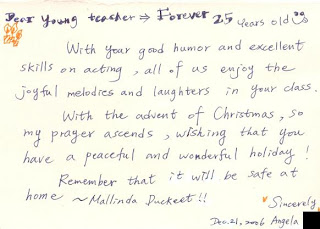-------- Original Message --------
| Subject: | Composition: Cheat Sheet: This is the way a Cheat Sheet should look. |
| Date: | Mon, 15 Dec 2008 14:34:08 +0800 |
| From: | rdca25@gmail.com |
| To: | undisclosed-recipients:; |
CHEAT SHEET
This is what a Cheat Sheet should look like; its length is unlimited, depending on what you need to remind yourself. This is one example where "cheating" is to be encouraged. Each writer will have to find their own style to use in a cheat sheet. I used short-hand notation. Take #1: I know I mean "ten" as the final word of a quotation. This reminds me that after a quote, a comma follows, then the attribution ("he said"). #2 reminds me that though words are capitalized after an exclamation point (!) this is not so after a closed quote. #11 reminds me that the name of a song is in quotes but the name of an album is italicized. And so on. Of couse a cheat sheet is not useful unless you know how to generalize. For example, #10 is not useful unless I can apply that style generally to all newspapers, not just to the Times! Notice that in #32, the name of the newspaper is now written in Roman (regular) font, because the entire sentence is already in italics! Finally, for advanced writing (graduate work, publications), the student must always follow the required style manual. A FINAL CAVEAT: NEVER follow web pages. They're not reliable, unless from a reputable source, such as the New York Times or another major newspaper, and maybe not even then, because even reputable publications may follow their own style rules. Note I violate my own rule with the words, A FINAL CAVEAT. That's typography. I KNOW what I'm doing (like typing KNOW instead of know). Besides, this is perfectly okay for flashy typography; but I would never capitalize for emphasis for a publication or a formal letter. Quite simply, students must get into the habit of following rules before you can deliberately violate them.
1. ten," he said.
2. cold!" he said.
3. "Are you cold?" he asked.
4. "Are you cold?" She didn't answer.
5. cold! He went home.
6. Moon Lake in Summer (title, centered at top of the page)
7. I read "Moon Lake in Summer," the short story.
8. I read Moon Lake in Summer, the novel.
9. I saw the movie, Moon Lake in Summer.
10. A review of the film was featured in the New York Times.
11. I love the song, "Let It Be."
12. I bought The Beatles' Let It Be album.
13. The child was three years old.
14. The three-year-old child fell asleep.
15. RIGHT: He was born on May 20, 1988. RIGHT: He was born on 20 May 1988. WRONG: He was born on May 20 1988. WRONG: He was born on May 20th, 1988.
16. I wonder where Mother is.
17. I wonder where my mother is.
18. "Bob taunted me, 'You lose the game!' and I got angry."
19. My brother was injured on Pine Street.
20. My brother was injured on the street.
21. I interviewed President Lin of Knowall University.
22. I interviewed the president of a university.
23. Comma splice: WRONG: I interviewed the president of the university, he was very polite.
RIGHT: I interviewed the president of the univeristy. He was very polite.
24. Fused sentence: WRONG: I interviewed the president of the university he was polite. RIGHT: I interviewed the president of the university. He was polite.
25. Emphasis: WRONG: It was VERY cold." RIGHT: It was very cold.
26. WRONG: The General Washington crossed the Delaware. RIGHT: General Washington crossed the Delaware.
27. RIGHT: The general, Washington, crossed the Delaware. WRONG: The general, Washington, crossed the delaware.
28. WRONG: She found him-dead. RIGHT: She found him--dead. BETTER: She found him—dead!
29. WRONG: She got sick.So she failed the class. RIGHT: She got sick. So she failed the class.
30. WRONG: I couldn't hardly wait. RIGHT: I could hardly wait.
31. He read the Taipei Times.
32. He read the Taipei Times.
33. He crossed the stream in the north of the country and dried his clothes in the hot sun. ELLIPSIS: He crossed the stream . . . and dried his clothes . . . .
















































